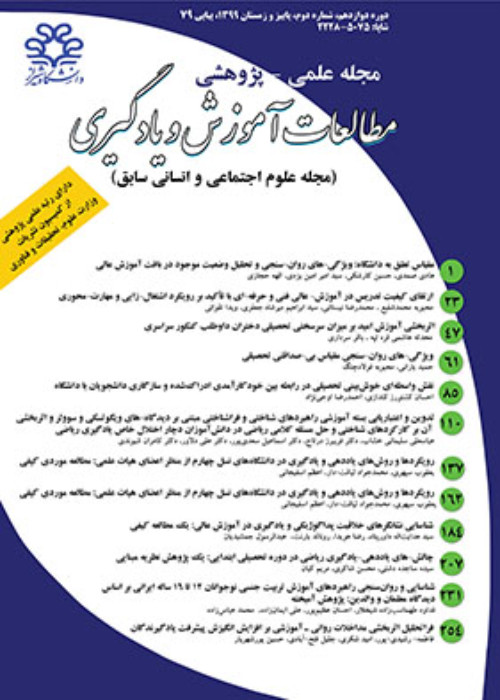Mathematical Literacy of the Fifth Grade Pupils in Sanandaj Primary Schools and its Relation to the Witkin's Cognitive Style
Author(s):
Abstract:
Introduction
Today, there is no doubt about the role and importance of mathematics in the global economic transformation. Mathematics can be considered as a very important means by which pupils’ understanding, perceptions and reasoning ability are improved. Indeed mathematical literacy provides learners with an awareness and understanding of the role that mathematics plays in the contemporary and modern society. Mathematical literacy is a subject driven by life-related applications of mathematics. It enables learners to develop the ability and confidence to think numerically and spatially in order to interpret and critically analyze everyday situations and to solve problems. According to Langnink (2005), mathematical literacy will result in the ability to understand mathematical terminology. Additionally, it will also develop the use of basic mathematical skills in critically analyzing situations and creatively solving everyday problems.As knowledge expands and the economy evolves, more people work with technologies or work in settings where mathematics is a cornerstone. Problem solving, information processing, and communication are becoming routine job requirements. Outside the workplace, mathematics arises in everyday situation. Mathematical literacy is necessary both at work and in daily life. It is one of the keys to coping with a changing society.Research Questions: This paper aims to investigate the status of mathematical literacy among the fifth grade pupils and review its relationship with the pupils’ cognitive style. Therefore, the main research questions were as follows:1-To what extent are pupils qualified in mathematics literacy?2-To what extent is the pupils’ mathematics literacy affected by their gender?3-To what extent is the pupils’ mathematics literacy affected by their cognitive styles?Method
This study has a causal-comparative research design. Using cluster sampling, 360 pupils studying at 18 Sanandaj primary schools were selected. These schools represented all-advantaged, semi-advantaged and deprived schools. Additionally, the participants included both male and female pupils on an equal basis. In order to collect the data, two scales and a personal information questionnaire were used. The first scale was an international performance test which examines pupils’ mathematics literacy. This test includes 44 closed-item questions. The second scale was a cognitive style test developed for examining individuals’ cognitive styles by Witkin and his colleagues in 1971. This test includes three sections in which over all 25 pictures are presented to the participants. To analyze the research data, both descriptive and interferential statistics including independent t-test, one-sample t-test, ANOVA and Kruskal-Wallis nonparametric test were used. Results
The results obtained from data analysis are given below in the same order as research questions are presented. Descriptive analysis was employed to examine and compare male and female pupils’ mathematics literacy. This shows that although both male and female pupils have had an average level performance on their mathematics literacy, there exists a significant difference between them in terms of mathematical literacy performance. This is while no meaningful difference is reported between male and female pupils in terms of their cognitive styles. In addition, the findings showed a significant difference between pupils with high and low mathematical literacy scores in terms of their cognitive styles. Moreover, the findings showed that the pupils’ mathematical literacy performances were significantly different in terms of type of school conditions (advantaged, semi-advantaged and deprived schools).Discussion
As the research results showed, the performance of the pupils in mathematics literacy was not very satisfactory. This confirms the findings of TIMSS and TIMSS-R which have shown that Iranian students have low performance on Mathematics and Sciences. On the other hand, the result revealed that the pupils’ performance in ML was affected by their cognitive styles. This is while the pupils’ gender was not considered as an interfering variable on their performance in ML. However, as initially mentioned, mathematics is a fundamental human endeavor that empowers individuals to describe, analyze, and understand the world we live in. Mathematics is embedded in the way we live and work in the information age. Mathematical literacy, therefore, is a prerequisite for success in today’s world. With mathematical literacy, doors are open and the future is bright. This qualification involves more than executing procedures. It implies a knowledge base and the competence and confidence to apply this knowledge in the practical world. As a result, a mathematically literate person can estimate, interpret data, solve day-to-day problems, reason in numerical, graphical, and geometric situations, and communicate using mathematics. For this ML is as important as proficiency in reading and writing.In spite of this, the challenge of achieving mathematical literacy for all is a complex one calling for a multi-pronged approach. To achieve this vision, this research has suggested the following priorities for educators to focus on:-adopting the best mathematics instructional and assessment strategies for all pupils, with emphasis on strategies that direct them to have an appropriate and effective cognitive styles;-using information more effectively to identify and track the progress of pupils in ML;-providing stronger leadership at all the levels of the educational system to promote ML for all;-strengthening family and community links to support pupils at risk in ML; and-encouraging innovation to address barriers to the success of low achievers in ML.Keywords:
Language:
Persian
Published:
Studies in Learning & Instruction, Volume:5 Issue: 1, 2013
Pages:
87 to 102
magiran.com/p1253382
دانلود و مطالعه متن این مقاله با یکی از روشهای زیر امکان پذیر است:
اشتراک شخصی
با عضویت و پرداخت آنلاین حق اشتراک یکساله به مبلغ 1,390,000ريال میتوانید 70 عنوان مطلب دانلود کنید!
اشتراک سازمانی
به کتابخانه دانشگاه یا محل کار خود پیشنهاد کنید تا اشتراک سازمانی این پایگاه را برای دسترسی نامحدود همه کاربران به متن مطالب تهیه نمایند!
توجه!
- حق عضویت دریافتی صرف حمایت از نشریات عضو و نگهداری، تکمیل و توسعه مگیران میشود.
- پرداخت حق اشتراک و دانلود مقالات اجازه بازنشر آن در سایر رسانههای چاپی و دیجیتال را به کاربر نمیدهد.
In order to view content subscription is required
Personal subscription
Subscribe magiran.com for 70 € euros via PayPal and download 70 articles during a year.
Organization subscription
Please contact us to subscribe your university or library for unlimited access!



